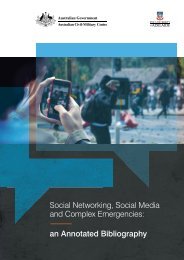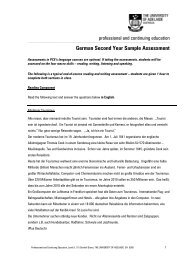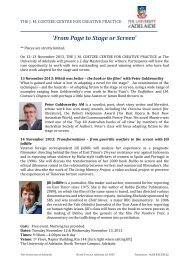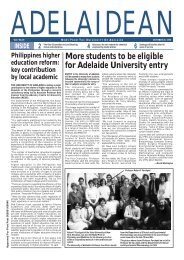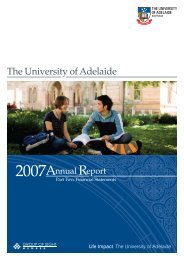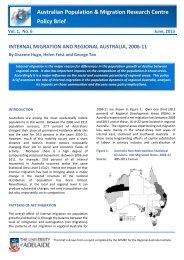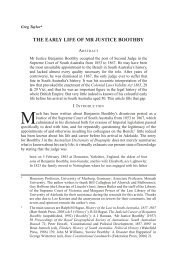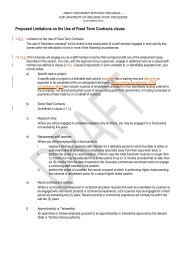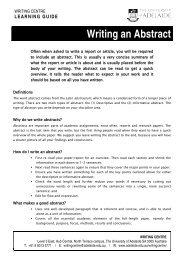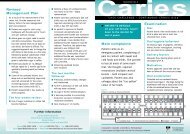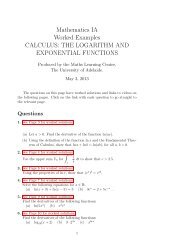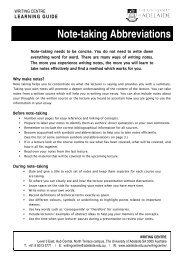Unbridling the Tongues of Women - The University of Adelaide
Unbridling the Tongues of Women - The University of Adelaide
Unbridling the Tongues of Women - The University of Adelaide
You also want an ePaper? Increase the reach of your titles
YUMPU automatically turns print PDFs into web optimized ePapers that Google loves.
<strong>Unbridling</strong> <strong>the</strong> tongues <strong>of</strong> women<br />
differential calculus, all <strong>of</strong> politics including <strong>the</strong> Mexican constitution, <strong>the</strong> current<br />
sermons, housing, <strong>the</strong> prices <strong>of</strong> commodities, <strong>the</strong> scarcity <strong>of</strong> domestic helpers and<br />
<strong>the</strong> changes <strong>of</strong> vocations for young men and women. Nothing was taboo apparently<br />
except bad language’. 43 And that included money. Ano<strong>the</strong>r comparison with Austen<br />
which can be made was Spence’s treatment <strong>of</strong> money. Ellen Moers has pointed out<br />
that ‘From her earliest years, Austen had <strong>the</strong> kind <strong>of</strong> mind that inquired where <strong>the</strong><br />
money came from on which young women were to live, and exactly how much <strong>of</strong> it<br />
<strong>the</strong>re was’. Spence was nei<strong>the</strong>r as precise nor as witty about money as Austen, though<br />
many readers echo Clara Morison’s laughter at Mrs Tubbins’s newly-acquired riches<br />
in <strong>the</strong> shape <strong>of</strong> a piano on which she puts <strong>the</strong> children to bed at night, but she shared<br />
<strong>the</strong> realism which led Moers to observe: ‘Marriage makes money a serious business<br />
in Austen’s fiction; her seriousness about money makes marriage important’. 44 Clara<br />
Morison is eventually relieved <strong>of</strong> her burdensome struggle to win an independent<br />
livelihood by her marriage to <strong>the</strong> adequately provided pastoralist Charles Reginald.<br />
But in <strong>The</strong> Author’s Daughter such realism has to be got out <strong>of</strong> <strong>the</strong> way if Spence is<br />
to present her moral <strong>the</strong>me clearly, so she takes pains to establish that <strong>the</strong> three masculine<br />
elements competing for dominance over her orphaned heroine – her English<br />
stepbro<strong>the</strong>r; <strong>the</strong> English peer who is her suitor; and her childhood suitor, <strong>the</strong> colonial<br />
son <strong>of</strong> Scottish emigrants to Australia – are all more-than-adequately endowed<br />
financially. Such a concern in Austen, Moers considered, ‘may be <strong>the</strong> first obviously<br />
feminine thing about her novels, for money and its making were characteristically<br />
female ra<strong>the</strong>r than male subjects in English fiction’. 45 In Spence’s novels it is one <strong>of</strong><br />
<strong>the</strong> most basic considerations in domestic life.<br />
Spence did present direct experience <strong>of</strong> <strong>the</strong> public world in three <strong>of</strong> her novels.<br />
Mr Hogarth’s Will, <strong>the</strong> book she had completed for serialisation in <strong>the</strong> Weekly<br />
Mail shortly before she left on her visit to England and Scotland, has excursions<br />
to a séance in London, an electoral meeting in rural Scotland, a discussion among<br />
scheming crooks in a public hostelry in rural South Australia, and defeat <strong>of</strong> <strong>the</strong><br />
schemers on <strong>the</strong> streets <strong>of</strong> Melbourne. Ga<strong>the</strong>red In takes its readers through a murder<br />
beside a deserted, water-filled mine-shaft and a public trial <strong>of</strong> an innocent hero. In<br />
Handfasted, <strong>the</strong> hero’s wish to show <strong>the</strong> heroine a world <strong>of</strong> which she knew nothing<br />
provides a rationale for trekking tourist-fashion through a variety <strong>of</strong> different public<br />
environments in <strong>the</strong> United States and Britain. <strong>The</strong>re is a vividly realised moment <strong>of</strong><br />
feminist wish-fulfilment in Mr Hogarth’s Will, in her portrayal <strong>of</strong> Francis Hogarth’s<br />
election meeting. Young Hogarth, showing a thoroughly Spenceian refusal to pledge<br />
50



